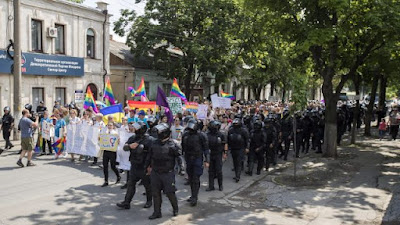 |
| (Image credit Google) |
Singapore is set to repeal a law banning gay sex, effectively legalizing gay people living in the city. The decision, announced by Prime Minister Lee Hsien Loong on national TV, comes after years of intense debate. The LGBT community in Singapore hailed the move as a 'victory for humanity'. The city-state is known for its conservative traditions, but in recent years a large number of people have called for the abolition of the colonial-era 377A law.
After India, Taiwan and Thailand, the demand for LGBT rights is gaining momentum in Singapore.
The government earlier wanted to retain Section 377A, which bans sex between men, but promised not to implement the law in an attempt to appease the parties.
On Sunday night, Lee said he would repeal the law because he believed it was "the right thing to do and most citizens would accept it."
He said, "Homosexuality is now being accepted in a better way and the removal of 377A will bring the country's laws in line with current social attitudes and I hope that Singaporean gays will find some relief." will.'
Gay campaigner Johnson Ong told the BBC: "We finally did it and we're excited that this discriminatory, antiquated law is finally coming to an end. It may have taken a while but it had to happen. Today we are very, very happy.
A coalition of LGBT rights groups called it a 'hard-won victory for love over fear' and said it was the first step towards full equality.
But he also expressed concern over another announcement by Lee in the same speech:
Lee said the government would ensure better legal protections for the definition of marriage between a man and a woman, but that it would make it harder to legalize same-sex marriage.
He said that Singapore is a traditional society where many people want to maintain family and social traditions.
LGBT activists described it as "disappointing" and warned it would further divide society.
Meanwhile, a conservative group, Protect Singapore, said it was "deeply disappointed" that the repeal of the law was proceeding without assurances of "comprehensive measures".
He also called for the full inclusion of the definition of same-sex marriage in the constitution, as well as the repeal of laws banning 'LGBT education' among children.
Increased support for LGBT
Singapore inherited 377 A from the British and retained it even after independence in 1965.
Although the law technically criminalizes sex between men, it is seen as a ban on homosexuality.
Since it has not been actively enforced in recent years, perhaps Singapore has developed a fast-growing LGBT community, including facilities such as gay nightclubs.
In Singapore, for example, any content deemed to 'promote homosexuality' can be banned from airing, and TV shows and films have been censored in the past.
The law is also at odds with Singapore's image as a liberal, diverse and global financial hub, and multinational companies based in the state have said it will hinder efforts to attract talent.
The legacy of the British
Singapore is not the only former colony, where a version of 377 is in force. This law still exists in many parts of Asia and Africa.
It was introduced by the colonial British government in India in the 19th century and prohibited 'sexual intercourse against the order of nature with any man, woman or animal'.
In 2018, India's Supreme Court struck down 377 in a landmark ruling, raising hopes among activists that other former colonies would eventually follow suit.
In recent years, other parts of Asia have also moved towards legalizing same-sex marriage.
Taiwan became the first Asian country to do so in 2019, and in June Thailand approved a draft law allowing same-sex unions.
Several former British colonies such as Kenya, Malaysia and Myanmar still have some version of the 377.





0 Comments